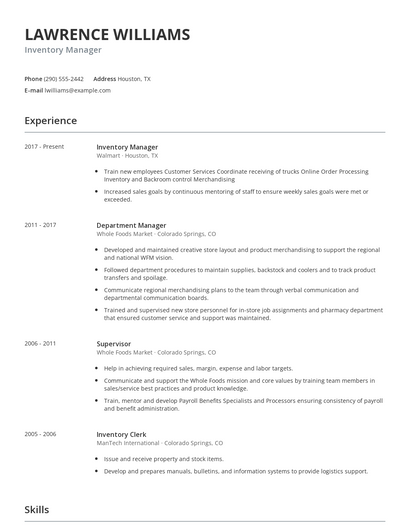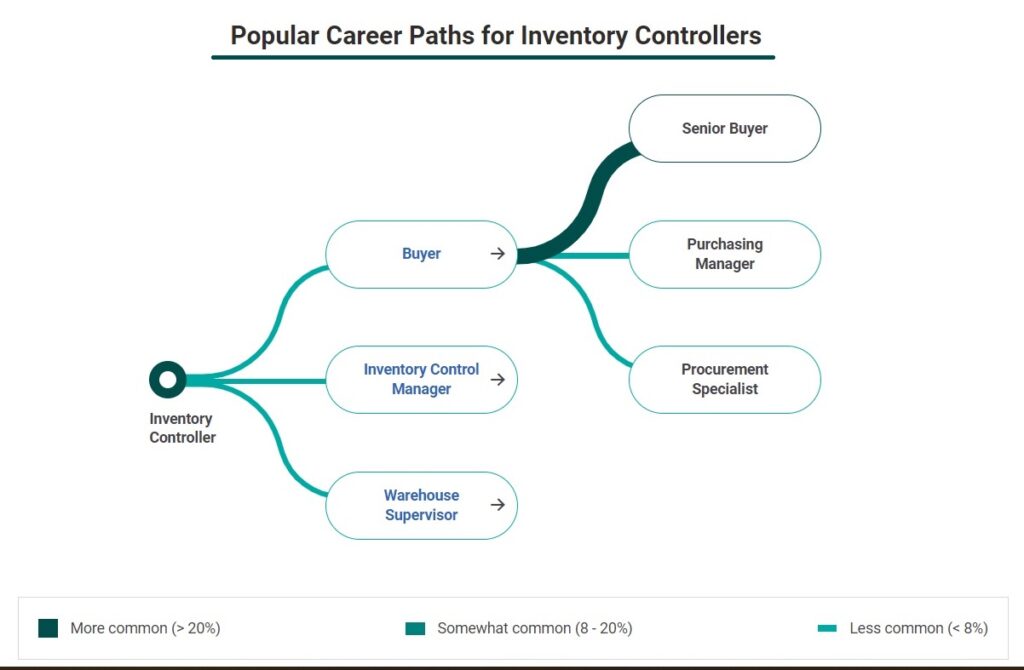Career Counselling and Guidance
Role of an Inventory Manager
Eric Walker
February 22, 2023
Inventory management is an important role in any successful business. An inventory manager is responsible for ensuring the right amount of products are available to meet customer demands . They focus on keeping inventory costs low. As a manager, they must possess a wide range of skills to stay on top of the ever-changing needs of their business and customers.
The duties of an inventory manager include creating and monitoring stock levels, coordinating with vendors and developing efficient ordering systems. Optimizing warehousing operations is very critical skillset for this role . In this blog post, we will look at the inventory manager roles, responsibilities, job opportunities for manager inventory in different industries and the automations in this role.
What is the role of Inventory Manager?
An inventory manager is a professional responsible for managing and tracking the items, materials, and products that a company has in its possession. This can include anything from raw materials to finished goods. Inventory managers are tasked with overseeing the ordering, storing, sorting, labeling, and restocking of any item that is necessary for running business operations.
Inventory management is essential for businesses to run smoothly and efficiently. It involves making sure that all items are properly stored and accounted for so as not to waste resources or money due to overstocking or under stocking of materials. The inventory manager will also be responsible for keeping accurate records of stock levels, monitoring trends in supply and demand, ensuring appropriate reordering times so that nothing runs out unexpectedly, and assessing current levels against sales forecasts.
Inventory Manager Duties and Responsibilities
Inventory Management is the process of overseeing and tracking all the materials, supplies, products and other items that a business uses. It ensures that a business always has the right amount of inventory to meet customer needs. The duties and responsibilities of Inventory Management are crucial to any organization’s success.
Inventory Managers are responsible for monitoring levels of stock; ordering new items when needed; forecasting future demand; maintaining records such as item numbers, costs and delivery times; ensuring inventory accuracy; and setting inventory goals. They also ensure that goods are stored safely and securely in accordance with company policies. Additionally, Inventory Managers work closely with suppliers to ensure timely deliveries for customers or clients.
Inventory Managers must have superior organizational skills, strong communication abilities and an understanding of accounting principles in order to succeed in this role.
Qualifications & Skills Needed
Inventory managers are essential to ensure a company’s success. Their roles and responsibilities include overseeing the inventory system, maintaining accurate records of stock levels, and monitoring stock replenishment needs. To be successful in their role, an inventory manager must possess certain qualifications and skills.
A bachelor’s degree in business management or a related field is the minimum requirement for most inventory manager positions. Additionally, employers may prefer candidates with knowledge of supply chain management principles and data analytics software such as Microsoft Excel. Relevant experience will also help when applying for this position: previous roles such as logistics coordinator or warehouse supervisor can demonstrate expertise in managing inventory systems.
In addition to educational requirements and work experience, an ideal candidate should also demonstrate excellent organizational skills as well as strong problem solving and analytical abilities needed to successfully manage inventory operations.
Inventory Manager Resume
An Inventory Manager must possess strong organizational skills and attention to detail, as well as be able to think on their feet when dealing with unexpected issues or customer requests. Those looking for employment in this field should create a resume that highlights the necessary qualifications, such as an understanding of warehouse operations and systems, experience working with orders, shipments and deliveries, knowledge of pricing techniques, familiarity with inventory management software programs and accurate master data management abilities.
A successful Inventory Manager can help ensure the smooth running of an organization’s stockroom or warehouse from day-to-day.
Benefits of an Inventory Manager
Inventory managers play an important role in running efficient businesses and can bring a range of benefits to their employers. First, inventory manager jobs are responsible for managing stock levels, ensuring that the right products are available to customers when they need them. This helps businesses maximize profits by avoiding overstocking or selling out of vital items. Additionally, inventory managers ensure effective ordering processes and cost controls, helping businesses save money on the products they need to operate.
Inventory manager jobs also involve overseeing the storage of goods and supplies, which allows for quicker access to materials when needed in order to optimize production schedules and reduce production costs. Inventory managers help develop strategies for dealing with shortages or excessive inventory as well as other operational problems related to purchasing and storage needs.
Having an experienced Inventory manager in the team will help the inventory management process. Moving the goods between the retail stores or the other business units in an efficient way is important for the company.
Challenges of the Role
The role of an inventory manager is to oversee the flow of goods in and out of the organization’s stockroom. As such, it can be a challenging job with a variety of responsibilities.
Inventory managers are responsible for ensuring that all incoming products are accurately accounted for and stored properly. They must also monitor stock levels on a daily basis to ensure sufficient quantities are available in case customer demand increases.
They must identify any discrepancies between physical inventory counts and records, as well as investigate any issues related to storage or delivery timelines. Additionally, they must develop strategies to keep inventories lean and efficient while minimizing losses due to theft or expiration dates.
Furthermore, an inventory manager needs excellent communication skills to coordinate with suppliers and other external partners.
Inventory Manager Job Opportunities
Inventory manager jobs provide professionals with an opportunity to work in a variety of industries and job settings. From government agencies to private corporations, inventory managers are responsible for organizing, maintaining and tracking inventory data. Additionally, they must have the skills necessary to manage large amounts of goods and supplies.
Inventory managers typically need a college degree in business or logistics management. They should also possess strong organizational, problem-solving and communication skills. In addition to their day-to-day tasks, inventory managers must stay up-to-date on industry trends to ensure their organization’s stock is properly managed and remains profitable. With the right qualifications, experience and training, these positions offer a great career path for ambitious individuals looking for job stability and potential salary growth.
You start off your career as Inventory Associate in any business. An inventory associate keeps track of the goods and supplies of a company. They keep records of inventory, monitor and manage shipments, coordinate with vendors, check stocks of items, and conduct data entry.
After you gain experience as Inventory Associate, you move up to Inventory Executive. An Inventory Executive take bigger responsibilities in the organization. They may be doing the Replenishment , Inventory Forecasting · management, inventory optimization using Inventory manager Software.
Inventory Manager Skills
- Leadership and management.
- Very good Verbal and written communication.
- Organizational and logistics skills.
- Must have Strong attention to detail.
- Must be good at Problem solving skills
- Comfortable with Data analysis using Excel/Add-Ins
- Must have Interpersonal abilities
- Great at Team orientation
Inventory Manager in Jewelry Retail
An Inventory Manager Role with Brick and Mortal Retailer follows the traditional approach what inventory management practices done in other industries.
The Do’s and Don’ts for the Inventory Manager in Jewelry:
- Don’t Stock the Old items
- Regular Inventory Display Changes
- Control what you buy
- Plan your purchasing time
- Don’t Stock stuff that doesn’t sell
- Buy Premium Quality
For an E-Commerce based Retail brands, in addition to the above, tracking the customer buying behaviors, pricing analytics and spending power will help you plan the Inventory management.
Inventory Manager Job Description
Inventory managers are in charge of handling the storage and distribution of goods as well as overseeing inventory levels. This job requires individuals to effectively manage stock, order products, track shipments and maintain records. If you’re looking for an exciting career with a lot of responsibility and leadership opportunities, then a job as an inventory manager may be right for you.
In this role, you will ensure that product supplies are replenished in a timely manner in order to meet customer demands. You will also be responsible for verifying orders by checking items against purchase requisitions or packing slips. Additionally, you will have to organize supplies according to size or type, update computer databases with information on suppliers and materials received and prepare reports regarding inventory accuracy and cost projections.
The Job description for Inventory Manager may vary from industry to industry. In small sized companies, one person may handle the entire inventory, depending on SKUs. Inventory Manager Jobs are predominantly available in Manufacturing hubs in any country. There is very less attrition rate with this particular role.Professionals tend to stay with the company for longer time.
With this critical role comes great opportunity: the average salary of an Inventory Manager is $57,000 per year, according to PayScale. The ideal candidate should possess strong problem-solving skills, excellent organizational abilities and a keen eye for detail when it comes to monitoring stock levels. You should also have excellent communication skills so that you can effectively communicate with staff, suppliers and customers alike regarding orders and inventory inquiries.
The Inventory Manager Salary may vary according to country pay rates.
Inventory Control Techniques
Inventory control is an important aspect of managing a successful business. This is because keeping accurate and up-to-date records of inventory levels can help to reduce costs, prevent losses, and ensure customer satisfaction. There are several techniques that businesses can use to effectively manage their inventories.
First, regular physical counts should be conducted in order to compare the actual inventory count with what is recorded in the company’s system or database. Doing this regularly will help to identify any discrepancies between what is expected and what really exists. Additionally, businesses can also implement inventory tracking software, which will allow them to track all aspects of their inventories from purchase orders through delivery and sales transactions.
Another technique for effective inventory control involves setting a reorder point based on usage data over a certain period of time so that new stock can be purchased before existing stock runs out. Following the inventory control objectives, one can devise a better inventory control process. For any new hire as Inventory Associate, learning the inventory control objectives is critical to the job.
Final Thoughts
In conclusion, an inventory manager plays a pivotal role in any business. They are responsible for managing stock levels, ensuring adequate supplies and overseeing the flow of goods through the supply chain. With their expertise and knowledge, inventory managers can help to make sure that businesses have what they need to meet customer demands. An effective inventory manager is an invaluable asset to any business, no matter the size or scope.
All Tags
